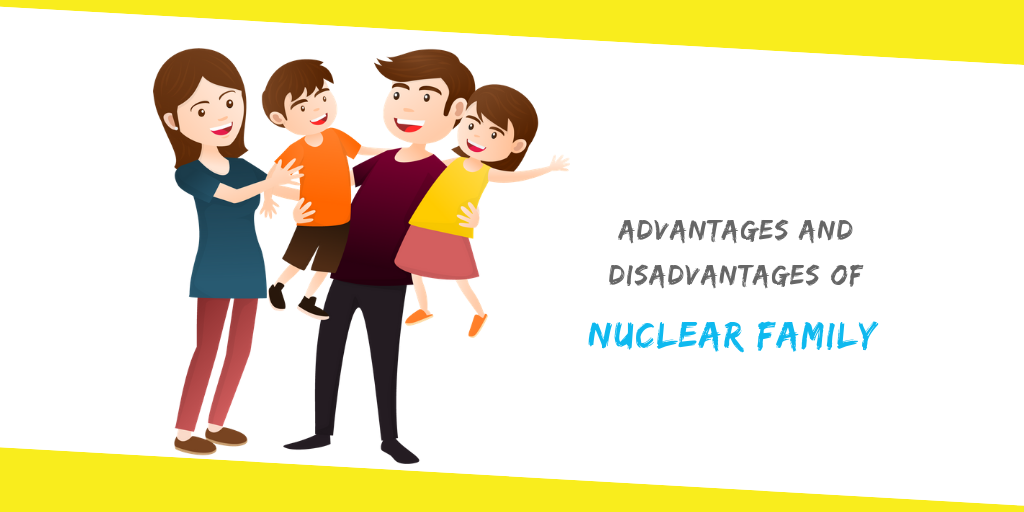Advantages And Disadvantages of Nuclear Family
This post was last updated on April 25th, 2021

The individual nuclear family comprises a worldwide social phenomenon. A nuclear family includes the husband, wife with their unmarried children. Immediately after marriage, the children discard their parental home and set up their individual household.
Thus, a nuclear family comprises an autonomous entity which is not controlled by the elders. The physical distance between parents and their married children reduces their mutual interdependence making the nuclear family mainly independent. Modern family constitutes a common example of nuclear family.
The concept of nuclear families began nearly three decades before, and while it was then a compulsion, today it is a matter of choice. The prime factor governing it is autonomy and independence with regard to decision making. It started when male sibling began leaving their family following marriage and mainly aimed at avoiding daily family quarrels.
The following lists the advantages and disadvantages of living in a nuclear family.
Advantages of Nuclear Family
1. Stability And Strength
Children emanating from a marriage are inclined to be more stable than children who are born from cohabitation. A research center discovered that 20% of children belonging to wedded parents faced divorce, while almost 50% of children coming from cohabiting families faced divorce. These two groups of kids carry an improved chance to live one day with a wedded couple as against children born to lone moms.
Devoted spouses or mates present a loving, considering and supportive association for their kids. This shifts to forthcoming success when kids know how to acquire positive associations and communicate nicely with others. Kids witness partners operating together to overcome problems, assign household duties and back each other across beneficial and negative matters.
2. Financial Stability Leads To More Opportunity
Most nuclear families possess sufficient economic stability for furnishing children with comforts, opportunities, besides a secure environment. It was noted by Pew Research Center that 57% of households having married parents had been comfortably over the poverty mark as compared to 21% for sole-parent households. Kids within nuclear families might get to attend gymnastics, music, dance or other kinds of classes, particularly when the two partners work away from home.
Kids with such opportunities have more propensities to succeed socially and academically.
3. Consistency Implies Behaviour Successes
An effective nuclear family offers children consistency for caretaking. Kids who have consistency along with stability within their lives have greater likelihood to display positive behaviour, achieve high marks in school besides showing deeper association in extracurricular and community activities. A nuclear family might dine together regularly, visit church and undertake family vacations that improves relationships and lays a strong foundation for upcoming life goals.
4. Promotes Education
Children belonging to parents carrying college degrees have more chance to go to and finish college themselves. One analysis shows educated parents less inclined to divorce while possessing greater resources to cater to kids. Pew Research Center mentions that parents having degrees have greater possibility to get in the labour group, which raises family income degree in literate, nuclear households.
The imposition of value upon education together with greater income level betters the intellectual future of kids.
5. Health Advantages
General research indicates kids in families that have married and biological parents possess better emotional, social and physical hygiene compared to other kids. This is due to married parents being less inclined to abuse kids. Nuclear families also have greater probability to utilize emergency homes and possess the resources to offer effective healthcare to kids.
The emotional stress on children residing in a peaceful household with 2 parents is considerably lower than children with 1parent or different caregivers.
6. Interaction Skills
Interaction among family members within a nuclear family involves fewer distractions and obstacles. With advances in technology, these families speed up communication away from home. Pew Internet and American Life Project analysis indicates that nuclear families have the greatest probability among all family kinds to utilize cell phones and internet.
This enables parents to track child internet usage more effectively and participate with children for online activities. Children carrying cell phones are able to remain in touch with parents regarding emergencies and schedule changes.
7. Autonomy
A nuclear family setup offers a huge advantage of being able to take autonomous decisions. It might be the desire of the new couple to set up their home as per their personal taste. Autonomy is also provided in the conduct of life such as socializing, guests, eating habits, outings, etc.
8. Creative Living
The nuclear family affords the new couple the opportunity to found fresh ways to carry on their lives. They have an opportunity to develop their individual rituals, customs and value systems within their family. They may creatively blend their individual family cultures to form a fresh refined culture.
Disadvantages of Nuclear Family
Each kind of family faces troubles and emergencies during life. The format of nuclear family does not always constitute a viable alternative due to various reasons.
1. Exclusion of Extended Family
The unit of nuclear family furnishes a powerful connecting experience for near family representatives. The size of smaller family permits individualized care for partners and kids which lead to lifelong attachments. Nevertheless, one analysis observes that a nuclear family entity can segregate people from various relatives and associations.
This disintegration of the extended family entity won’t be advantageous in difficult times. Grandparents, uncles, aunts and cousins possess a place in the structure of a family, though the nuclear family in not always conducive to these associations.
2. Burnout
It is suggested by Acts International that family members, especially mothers, possess an inclination to burn out regarding efforts to satisfy each person’s requirements. The prominence on kids can be overpowering and leave parents with little room to care for themselves. Lack of assistance by extended family may force parents to abandon work to look after ailing children.
The challenge to harmonize the requirements of family, work and relationships without external assistance causes stress, anxiety, depression and other issues.
3. Skills For Conflict Resolution
While reduced friction and family tension are included among the advantages of a nuclear family, the family is also placed at a loss. Conflict comprises a portion of life, with conflict resolution expertise being advantageous in school, workplace and the community. Nuclear families may evolve thinking on similar lines, resulting in lesser arguments in the family group.
Nevertheless, it can raise the conflicts for extended family representatives. Extended family having varying ideas and opinions can assist families view optional viewpoints and know to tackle external conflicts and opinion.
4. Little Support System
Emergency conditions, like a mishap or during illness, can cause crisis for tiny nuclear families. On the contrary, extended family setups provide built-in assistance in such situations.
Within a nuclear family having both parents working and bearing young children, it is not always practicable to be able to cater to all hopes and needs exclusively with the family entity. Multi-generational homes furnish assistance as required.
5. Heightening Stereotypes
The stress upon the nuclear family as finest practice aggravates stereotypes of sole mothers, cultural family arrangements and family setups resting on religion over the world. It has been suggested that nuclear households are not quite historically popular as believed earlier. The symbolism represented by this idea is an objective to seek for all whereas those in different situations acquire objection.
This normalized objective affects government programs and public policy that can omit various types of family.
6. Self-Centered Worldview
The Concordia University holds the conventional nuclear family to be child-oriented. This implies that the highlight is upon the near family, especially children. The family setup endeavours to attain its personal needs and puts secondary importance upon others.
This notion may cause children to develop selfish inclinations and thoughts. It may also generate a limited worldview which attaches slight consideration to the greater wellness of society.
7. Favoured Family Arrangement
The nuclear family is favoured by most to rear children, though cases of sole parent, separated and many generational households are increasing. The option to grow a family with the nuclear unit does not ensure happiness or success but can offer a basis to attain those objectives. All families lack perfection, however, by working along with family representatives, the best probable outcome for all concerned is ensured.
8. Erosion of Values And Culture
All joint family system transfers the legacy of family values that have been practiced since ages. These entire core features become lost somewhere as people adopt nuclear family entity.
Despite its many disadvantages, nuclear family is still regarded as a perfect family unit. It constitutes the most opted method to bring up kids. Though it doesn’t definitely ensure success yet it provides sufficient independence and strength to a person to discover ways to be happy and successful.
Nevertheless, by being aware of the inherent disadvantages, you can find ways to lessen them. Ultimately, no family is without flaws. But residing together with the whole family members assures the finest possible outcomes for all involved.
You may like this
Recommended For You
10 Marriage Secrets You Were Not Aware Of
Sujata Sanyal
Sujata Sanyal has been in the writing circuit for the past 7 years and has touched upon various genres like travel, health, lifestyle, a wee bit of technology, cuisine, product descriptions and a bevy of others. 1 part of her is interested in animated political discussions, 2nd part interested in studying biographies and the remainder part in love with music and socially relevant work. Too many parts?




